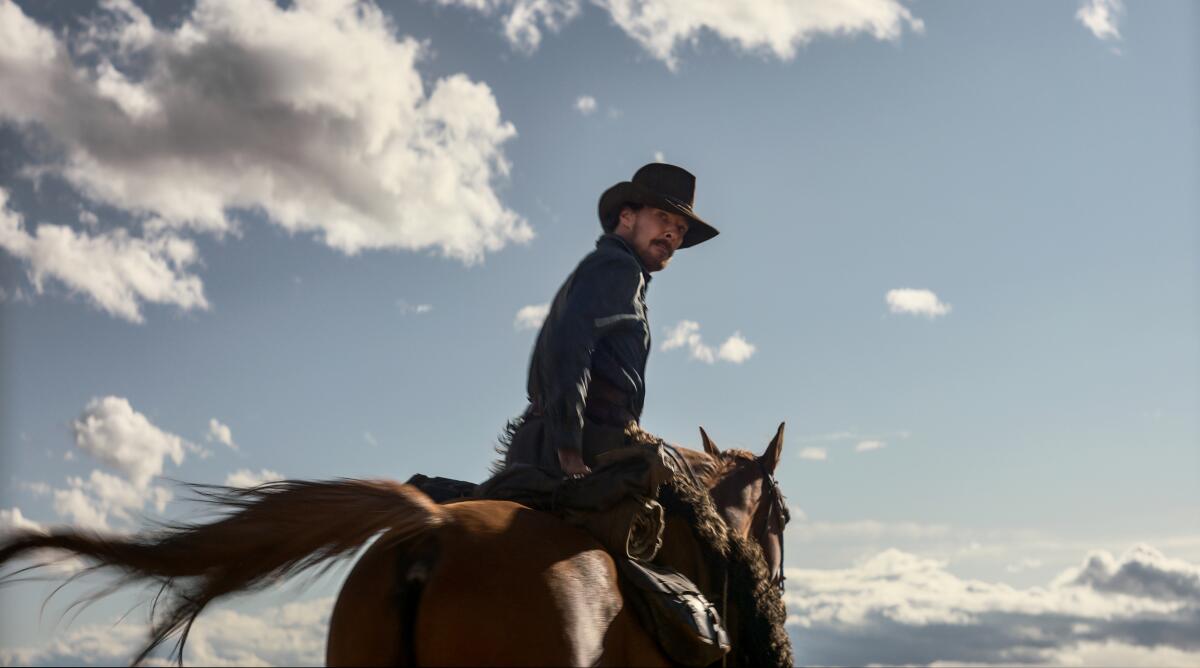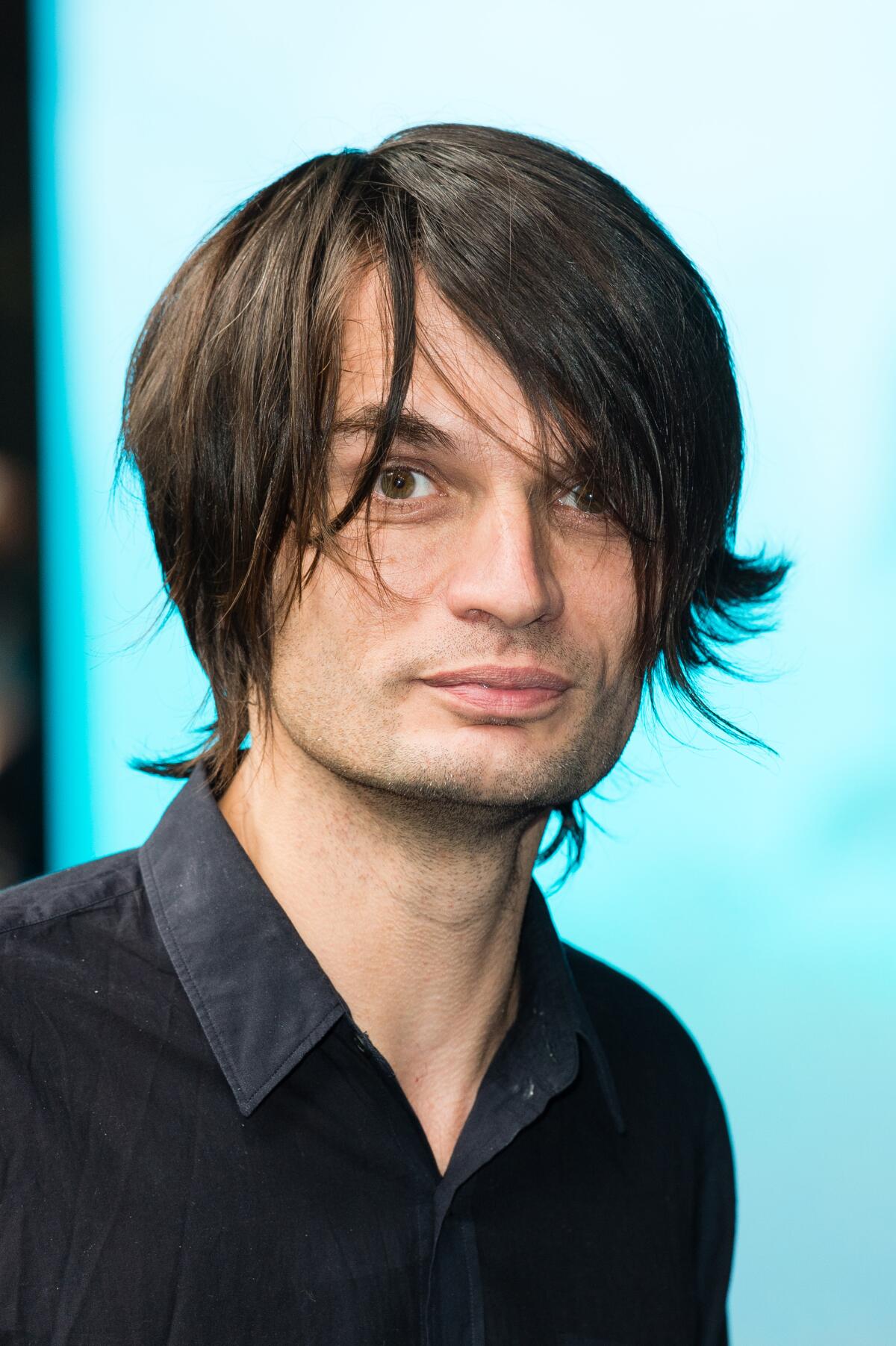Jonny Greenwood jazzes up the royals and modernizes the old West

- Share via
When the name Jonny Greenwood appears in a film’s opening credits, expect the unexpected. No longer merely “the guy from Radiohead” dabbling in film, Greenwood has quickly become one of the most inventive, surprising composers in Hollywood. He scored no less than three major films this year, all of them contenders this Oscar season: “Spencer,” “Power of the Dog” and “Licorice Pizza.”
“Spencer,” starring Kristin Stewart as Princess Diana on a horrific weekend with the royal family, ignores biopic conventions at every turn — it was, after all, made by “Jackie” director Pablo Larraín. And much like how the Chilean filmmaker went to Mica Levi for that film’s striking, seasick score, he hired Greenwood to get inside Diana’s haunted head.
Asked why he’s drawn to unconventional composers, Larraín said: “I try to work with people that I admire.”
Greenwood’s central concept was taking the staid baroque music often associated with the royals — “pastiche Handel, coronation fanfares with kettle drums and baroque strings playing as the Daimler sweeps into Buckingham Palace, you know the sort of thing,” he said — and giving it to a jazz band.
“It occurred to me that the instruments of the 1750s haven’t really changed so much in the intervening centuries, and that a good jazz group could travel back to those days and still make music with what they found,” said Greenwood, who wrote some ancient style themes for a traditional orchestra and then slowly replaced those instruments with drum kit, trumpet and upright bass. At times, “Spencer” sounds like a 1970s crime thriller.

“The idea was for the traditional score to mutate into free jazz at various speeds, and to various levels of chaos,” said Greenwood. “I hoped we could match the more chaotic, colorful nature of Diana’s presence in the middle of all that buttoned-up, British formality.”
Greenwood’s theme for Diana is a Bach-style piano partita, “but you listen to it,” said Larraín, “and it’s him, you know. He was able to turn a very sort of classic partita into something that can only be made by him, and has this sort of strangeness, and this feeling that is unsettling — and very enlightening too at the same time.”
A lot of the score was written before the shoot. That main theme is performed by a real-life vicar on pipe organ in a church scene, and an onscreen string quartet plays a Schubert-esque piece that slowly unravels during a stuffy dinner scene where Diana, feeling emotionally choked, rips off her pearl necklace and begins to eat the jawbreaker jewelry.
Like much of the film, the line between reality and imagined nightmare in that scene is fuzzy. In some ways, Greenwood noted, “Spencer” is a horror movie: “The innocent girl lured to the big, dark, freezing house, the lurking servants that appear from nowhere, the impossibly perfect food. These are all gothic horror tropes, so that was a big inspiration for the more atonal string stuff.”
“It’s a very specific psychological and emotional space that goes from a melodrama to a psychological terror in seconds,” said Larraín. Greenwood’s score, while never literal, “expands the psychological danger where Diana inhabits — in any direction. It could be more related to something that is stressful and full of panic or, depending on the composition and where it is, it could enlighten something that is more free.”
As eerie or tormented as the music gets, Greenwood often returns to the more romantic theme for Diana.
“I didn’t want the music to just be about chaos and abstraction,” Greenwood said. “The Diana in the film is more than just the clichéd crazy woman: She’s also a tender and caring mother, and clearly fond of some of the palace staff. She’s merely trapped.”
There are elements of entrapment and terror in next week’s “The Power of the Dog,” Jane Campion’s western starring Benedict Cumberbatch as a menacing cowboy and Kirsten Dunst as his fearful new sister-in-law. But Greenwood’s take on the western is about as far, musically, as Montana is from England’s Sandringham House.
Acknowledging the “baggage” that comes with the genre, Greenwood wanted to take this rough, turn-of-the-century story into modern territory. After first experimenting with atonal music for banjo and strings — “Guess what,” he said, “it was a terrible idea” — he had the idea of playing cello like a banjo, “finger-picking, essentially, and converting the cello fingerboard with bits of tape so I could stay in tune.”
That unique sound evokes the dusty exterior as well as the rotten interior of Phil (Cumberbatch), a character who manages to make the banjo feel threatening. Rose (Dunst) has a player piano in her saloon, and Greenwood programmed his own pianola to sound more honky-tonk.
“It’s a familiar sound in westerns — the saloon piano — so it was enjoyable pushing it into a more micro-tonal sound world,” he said. “Rose messes up her piano performance, so it made sense that there could be a theme for her that sounded like a very broken instrument.”
His commentary on the western landscape avoided sweeping, Aaron Copland strings, and opted instead for distant-sounding horns — “to make the countryside seem alien and forbidding rather than pastoral or bucolic.”
For Campion, the film’s key dynamic is between Phil and Rose’s effeminate son, Peter (Kodi Smit-McPhee) — the former constantly terrorizing the latter.
“There’s a scene where Peter is off alone in the semi-desert,” said Greenwood, “and it’s practically lunar. I was just trying to avoid the big strings-big sky tradition of westerns, and instead save the complex strings for the characters Peter and Phil.”
In each film, the musical clichés of genre are rejected or subverted. Greenwood’s unexpected scores go under the surface and into the psyches of some very complex and contradictory — i.e. human — characters.
And for Paul Thomas Anderson’s upcoming “Licorice Pizza”? Greenwood’s score is likely ineligible, due to its relative size to the director’s dominant use of preexisting music.
More to Read
From the Oscars to the Emmys.
Get the Envelope newsletter for exclusive awards season coverage, behind-the-scenes stories from the Envelope podcast and columnist Glenn Whipp’s must-read analysis.
You may occasionally receive promotional content from the Los Angeles Times.










